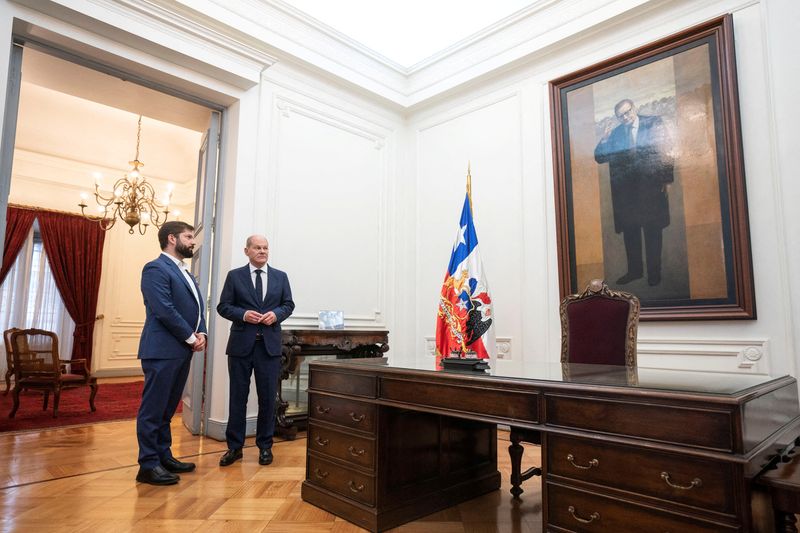3/3

© Reuters. Chile’s President Gabriel Boric and German Chancellor Olaf Scholz visit an area recreating the old office of former Chilean President Salvador Allende at La Moneda government palace in Santiago, Chile, January 29, 2023. Sebastian Rodriguez/Chilean Preside
2/3
By Sarah Marsh
SANTIAGO (Reuters) -German Chancellor Olaf Scholz lobbied this week for South America to prioritize cooperating with Germany in its commodities sector as Berlin joins the race for critical minerals, with lithium key for its auto industry.
Europe’s largest economy has fallen behind in the race for critical minerals, in part due to a distaste for the dirty business of mining as well as faith in the open market, German government officials say.
That has led to a reliance on China, which has invested widely in the mining sector in resource-rich South America and in processing commodities.
Now though, soaring demand for critical minerals and geopolitical concerns are sparking a push to better secure and diversify supply – for example through offtake agreements, stakes in mines, or possibly the establishment of Germany’s own processing capacity.
On his first tour of South America this week, Scholz visited both Argentina and Chile, which sit atop the region’s “lithium triangle,” the world’s largest trove of the ultra-light metal key to making batteries for electric vehicles.
In Santiago, he signed a new, expanded commodities partnership aiming at intensifying cooperation in the sector. That will include an annual bilateral forum and state instruments like investment guarantees to promote trade.
Given the environmental, labor and social concerns regarding mining – which have sparked anger and thwarted some projects in the sector – Germany’s high standards made it an ideal partner, Scholz said.
A new act that recently came into force, for example, insists high standards are observed throughout company supply chains.
“We want to help Chile on the way to a sustainable mining sector,” Scholz said in a news conference with his Chilean counterpart, pointing to a new cooperation deal signed between Europe’s largest copper producer Aurubis and Chilean state copper company Codelco.
Scholz did not announce any such agreements in Argentina, where investment conditions are considered trickier. Bolivia, also part of the lithium triangle, has been slow to move to production. A Bolivian-German lithium joint venture signed in 2018 fell apart two years later amid domestic political turmoil.
Germany wants to ensure mining generates jobs in the countries where it takes place, Scholz said.
“The question is: can we not ensure that the first round of processing, that generates hundreds if not thousands of jobs, can take place in the (source) countries? That would also save on a lot of transport,” Scholz said.
Green hydrogen was another sector where there was great scope for cooperation between Germany and South America, Scholz said, given the region’s huge potential for generating renewable energy and Germany’s pioneering technology.
Germany and Chile recently launched a hydrogen pilot project in Patagonia drawing on wind energy, with support from the German government and technology from Siemens Energy, he said.
Source: Investing.com




























